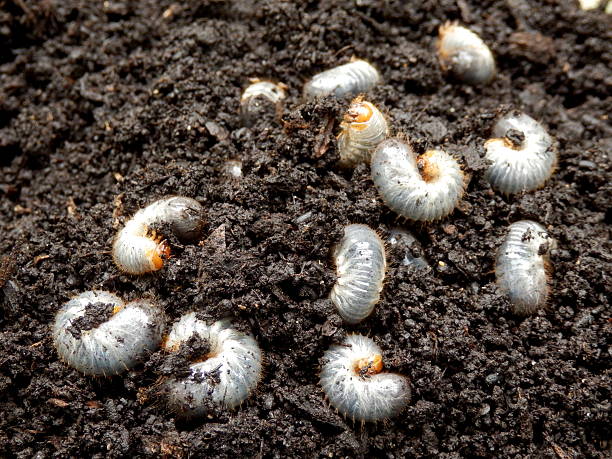Summertime in Florida brings far more than sunshine and beach days. Living in paradise also has its downfalls; The rain, heat, and humidity bring pests of all sorts causing damage to homes and lawns across Southwest Florida. One concern that our customers seem to have are white grubs. What are white grubs? They are time, white, c-shaped insects that are actually in the larval stage of June bugs. To understand white grubs better, you need to know their life cycle.
The Life Cycle of White Grubs
Usually, in the summer and fall, adult beetles lay eggs in the soil. The eggs grow into larvae (grubs) depending on the species. The grubs may feed in the soil for a year or more. They feed on the foliage of plants and vegetables. This is where you can see the damage to plants in your landscape.
Then sometime around October or November, when soil temps begin to cool, grubs cease feeding and move deeper into the soil to form an earthen cell and ultimately transform into pupae. The adult beetles emerge a few months later, in June or July, to complete the one-year cycle.
Now that we know a little bit about grubs let’s talk about ways to identify if grubs might be a problem in your Fort Myers or Cape Coral lawn. Have you seen any of the following:
- Plants that have suddenly wilted
- Some of your small plants are dying off
- Yellow patches in and around your lawn
- Seen raccoons, skunks, armadillos, opossums, crows, or ibis’s more often
- Small concentrated dirt mounds
- Inconsistent withering patches
If you answered yes to any of the above, then we need to now talk about how to fix the problem and prevent it in the future:
- Water properly because grubs thrive in moist warm environments. It’s better not to water your lawn daily. It is ideal for your lawn to have time to dry out between watering sessions while also giving it enough water to stay healthy
- Plant deep-rooted grasses
- Effective chemical control of white grubs depends on moving the insecticides down to the root zone where the grubs are feeding. Apply 1/2 to 3/4 inches of water immediately after application. Repeat irrigation every four or five days to continue moving the insecticides into the soil.
In conclusion, White Grub problems in Cape Coral & Fort Myers, Florida, can be a major issue during the summer months. These pests can cause significant damage to lawns and gardens, leading to costly repairs and maintenance. It is important to take preventative measures to protect your property from White Grubs, such as applying grub control products and maintaining a healthy lawn. If the problem persists or becomes out of hand, it is best to reach out to a professional pest control company like American Allegiance Pest Control.
With our expertise and experience, we can effectively eliminate White Grub infestations and prevent future problems from occurring. Protect your property and keep your lawn and garden healthy by addressing White Grub issues before they become a major problem.

